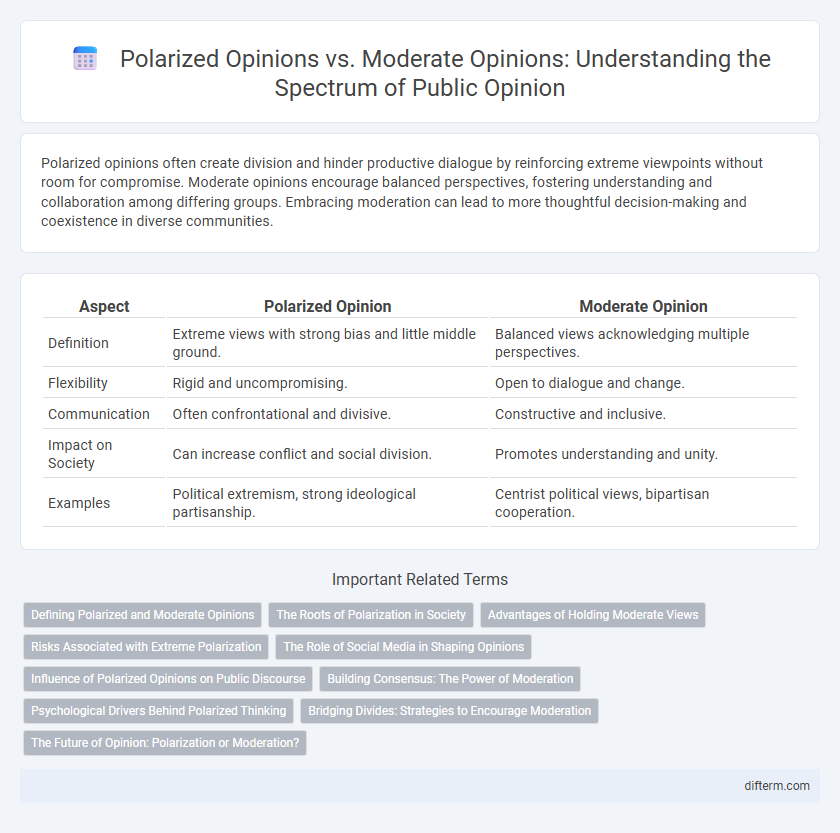Polarized opinions often create division and hinder productive dialogue by reinforcing extreme viewpoints without room for compromise. Moderate opinions encourage balanced perspectives, fostering understanding and collaboration among differing groups. Embracing moderation can lead to more thoughtful decision-making and coexistence in diverse communities.
Table of Comparison
| Aspect | Polarized Opinion | Moderate Opinion |
|---|---|---|
| Definition | Extreme views with strong bias and little middle ground. | Balanced views acknowledging multiple perspectives. |
| Flexibility | Rigid and uncompromising. | Open to dialogue and change. |
| Communication | Often confrontational and divisive. | Constructive and inclusive. |
| Impact on Society | Can increase conflict and social division. | Promotes understanding and unity. |
| Examples | Political extremism, strong ideological partisanship. | Centrist political views, bipartisan cooperation. |
Defining Polarized and Moderate Opinions
Polarized opinions represent extreme and opposing views often marked by strong emotional investment and unwillingness to compromise, creating significant division within societies. Moderate opinions embody balanced perspectives that embrace nuance, reflect openness to different ideas, and promote constructive dialogue. Understanding the defining characteristics of polarized and moderate opinions is crucial for fostering social cohesion and informed decision-making.
The Roots of Polarization in Society
Polarized opinions stem from deep-rooted social divides influenced by factors such as identity politics, media fragmentation, and economic inequality. These divisions are reinforced by echo chambers and selective exposure, limiting understanding between opposing groups and fostering mistrust. Addressing root causes requires promoting inclusive dialogue and critical media literacy to bridge societal gaps.
Advantages of Holding Moderate Views
Moderate opinions promote balanced perspectives, fostering constructive dialogue and reducing social division. Individuals with moderate views are more open to compromise, enabling effective problem-solving and collaborative decision-making. This approach enhances mutual understanding and cultivates a more inclusive environment in polarized settings.
Risks Associated with Extreme Polarization
Extreme polarization increases social division and hampers constructive dialogue, leading to political gridlock and reduced policy effectiveness. It fuels misinformation and entrenched biases, diminishing trust in institutions and democratic processes. Moderate opinions encourage compromise and nuanced understanding, mitigating risks of conflict and fostering social cohesion.
The Role of Social Media in Shaping Opinions
Social media platforms amplify polarized opinions by promoting echo chambers and algorithm-driven content that reinforces extreme views, limiting exposure to moderate perspectives. This digital environment fosters divisiveness and reduces the opportunity for nuanced discussions, essential for balanced public discourse. The role of social media in shaping opinions highlights the challenge of cultivating moderation amidst rapid information exchange and targeted content feeds.
Influence of Polarized Opinions on Public Discourse
Polarized opinions significantly shape public discourse by intensifying debates and creating distinct ideological camps, which often leads to reduced willingness for compromise. This division can amplify emotional responses and sensationalism in media coverage, overshadowing moderate viewpoints that promote balanced and inclusive dialogue. The dominance of polarized perspectives frequently marginalizes nuanced discussions, hindering the development of constructive public policies based on common ground.
Building Consensus: The Power of Moderation
Moderate opinion fosters a collaborative environment by bridging divergent views, facilitating constructive dialogue that polarized perspectives often hinder. Building consensus relies on balancing interests and prioritizing shared goals over extreme positions, which strengthens collective decision-making. Emphasizing moderation enhances social cohesion and paves the way for sustainable agreements in complex issues.
Psychological Drivers Behind Polarized Thinking
Polarized opinion often stems from cognitive biases such as confirmation bias and group identity, which reinforce extreme viewpoints by filtering information that aligns with existing beliefs. Emotional factors like fear, anxiety, and a need for social belonging amplify polarized thinking, making moderate opinions appear less appealing or even threatening. Understanding these psychological drivers can help in developing strategies to foster open dialogue and reduce societal divisions.
Bridging Divides: Strategies to Encourage Moderation
Bridging divides between polarized and moderate opinions requires fostering open dialogue that emphasizes common values and mutual understanding. Strategies like active listening, promoting empathy, and creating inclusive platforms encourage moderation by reducing extremism and facilitating compromise. Engaging diverse perspectives in collaborative problem-solving helps mitigate the impact of polarizing rhetoric and strengthens social cohesion.
The Future of Opinion: Polarization or Moderation?
Polarized opinion often drives intense public debates but risks deepening societal divisions and undermining constructive dialogue. Moderate opinion promotes compromise and inclusivity, fostering solutions that accommodate diverse perspectives. The future of opinion may depend on balancing passionate advocacy with reasoned moderation to sustain social cohesion and democratic resilience.
Polarized opinion vs Moderate opinion Infographic

 difterm.com
difterm.com